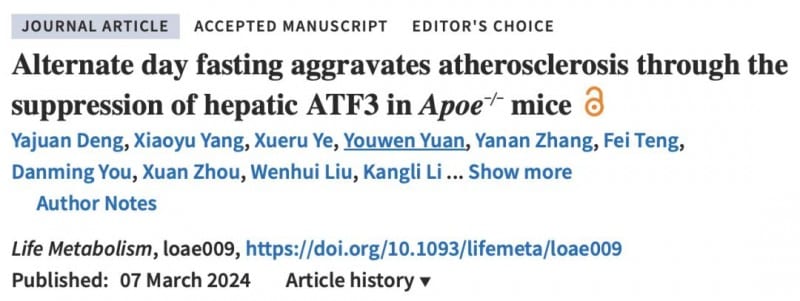New knowledge about green and slimming丨Southern Medical University found that fasting on alternate days may cause heart problems

[ad_1]
With the continuous development of society and economy, people’s quality of life has steadily improved, and health and life span have also been significantly improved. Modern society has formed a broad consensus on the pursuit of health concepts. Scientific methods such as exercise, fitness and balanced diet are widely used in daily life to guide us to actively pursue a healthy lifestyle.
However, the global epidemic of obesity has become a challenge that cannot be ignored. According to statistics, the number of obese people worldwide has exceeded 1 billion. In order to deal with obesity and related metabolic problems, people have tried various dietary intervention methods, among which intermittent fasting (IF) has received widespread attention.
Intermittent fasting was once all the rage!
Intermittent fasting has indeed attracted widespread attention and popularity in recent years, and has gradually become popular in the field of scientific research. Not only is it considered an effective way to lose weight, it is also promoted as a lifestyle that improves health and optimizes body function.
Green Slim Nutrition Consultant explained: “Intermittent fasting mainly includes three forms. One is daily time-restricted eating, that is, eating only within 8 hours a day and maintaining a fasting state for the remaining 16 hours; the second is “5:2 intermittent fasting” “Fasting” means eating normally 5 days a week and reducing caloric intake on the remaining 2 days; the third is Alternate Day Fasting (ADF), which means eating every other day.”
Studies have confirmed that fasting has positive effects on weight loss and extending the lifespan of animals. Further research has also shown that fasting has health benefits including improving metabolic health, preventing or delaying age-related diseases, and inhibiting tumor growth.
Is intermittent fasting “falling off the altar”?
However, there is still controversy regarding the benefits and potential risks of alternate-day fasting.
A research team from Southern Medical University recently found that eating on alternate days for 11 weeks may aggravate the formation of atherosclerotic lesions. Specifically, ADF changes the cholesterol metabolism pathway and inhibits the expression of activated transcription factor 3, thereby aggravating the formation of atherosclerotic plaques. Therefore, for people at high risk of atherosclerosis, ADF intervention may have adverse effects.
It follows that although intermittent fasting has potential health benefits in some aspects, its suitability still needs to be carefully evaluated. For certain groups of people, such as individuals at high risk of atherosclerosis, it is not advisable to blindly use ADF intervention to avoid adverse effects. In the future, further research is needed to explore best practices for fasting and its long-term effects on health.
Green Thin: Weight loss methods vary from person to person, and intermittent fasting should be treated rationally
As a means of weight loss, intermittent fasting is not universally applicable. Frequent intermittent fasting is not good for your health. Generally, those who want to lose weight should avoid trying it.
First of all, for the general population and obese people, its actual implementation is quite difficult. If you only restrict your diet for two days a week and indulge your appetite on the remaining five days, your overall energy intake will still exceed the standard and it will be difficult to achieve weight loss. In addition, for some individuals, prolonged fasting may induce hunger, nutritional imbalances and other health problems, or even produce more serious physiological reactions.
Secondly, everyone has their own biological clock. When the meal time comes, the digestive system will automatically secrete digestive juices. If food is not taken in at this time, acidic digestive juices will accumulate and corrode the gastrointestinal lining, leading to disease. Therefore, the gastrointestinal tract will still work even if you don’t eat, and frequent intermittent fasting is harmful to your health.
Finally, extreme intermittent fasting can lead to a significant decrease in muscle mass and bone density, and may damage immunity and the brain due to an imbalance in energy balance, causing symptoms such as dizziness and nausea. Intermittent fasting should be stopped immediately at this time, otherwise it may cause damage to the body or even endanger life.
Green Slim nutrition consultant reminds: “The method of weight loss varies depending on the individual’s cause of obesity. If you eat too much, you need to reduce the amount of food at each meal and increase exercise. If you have a heavy gastrointestinal burden due to greasy food in the past few days, you can moderate light intermittent fasting. Eat to let your body rest. It depends on the day’s activities. If you have a lot of static activities, eat less. If you plan to travel or exercise, you need to ensure adequate energy intake to prevent accidents. “
While intermittent fasting is popular, it doesn’t work for everyone. Before choosing intermittent fasting, we should understand our physical condition and needs, and consult a doctor or nutritionist for advice to ensure that our physical condition is suitable for dietary adjustments. Avoid choosing intermittent fasting for the blind pursuit of quick weight loss or miraculous results. Instead, use it as an auxiliary method, combined with reasonable diet and exercise, to achieve the coexistence of health and beauty.
[ad_2]
Source link







